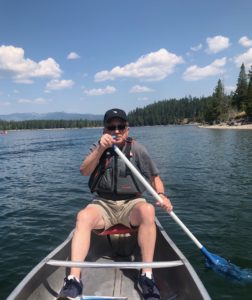 The Federal Reserve is about to stage its annual gathering of economists and other policy-makers in Jackson Hole later this month but I beat them here (seen above on Jackson Lake.) Which means that I get to help set the stage with these informal reflections on China, the environment, tourism, immigration and the like.
The Federal Reserve is about to stage its annual gathering of economists and other policy-makers in Jackson Hole later this month but I beat them here (seen above on Jackson Lake.) Which means that I get to help set the stage with these informal reflections on China, the environment, tourism, immigration and the like.
CHINA: The Chinese are here in surprising numbers. Everywhere I turn at major lodges and hotels, I’m hearing the distinct sound of Mandarin Chinese and even understanding some of it. I don’t see the Chinese on trails or lakes as much. They tend to congregate at comfortable places.
One implication is that the Chinese have an amazing amount of money. Some of the Chinese are living in the United States but others almost are certainly here from the mainland, which means they spent a lot of money to bring their families to the Grand Tetons and Yellowstone park areas. When I first started covering China in 1979, it would have been inconceivable that a Chinese family would be able to pay to travel to the United States, which they call “mei guo,” or pretty country.
The Chinese are exploding on the world stage. Everywhere I’ve been in recent years I have seen a Chinese presence. China is no longer a regional story. It is a global story.
So the assembled thinkers coming to Jackson Hole should contemplate what an interruption in the American relationship with China would bring. The tariffs that President Trump has started imposing on China run the risk of poisoning the entire relationship. The Chinese regard his efforts as clear evidence that the Americans don’t want China to develop further. In effect, we are trying to “contain” China, as we once did the Soviets.
When this discussion arises, family and friends ask, “Well, is it a level playing field between the two countries?” This phrase, “level playing field,” is one of the most deceptive phrases I have ever heard being applied to international economics. Of course, it isn’t a level playing field. The phrase implies that two nations trading with each other have identical cost structures and similar labor and governmental policies.
But China is governed by the Communist Party, which is increasingly assertive under President Xi Jiping. Economic and business decisions are governed by the party. We have no comparable political force in our country. Our systems are dramatically different, so how can there be a level playing field? I would say the same thing about Japan’s system, which is dominated by industrial groups called keiretsu and a government that advises and manages the Japanese economy. We can’t have a level playing field with Japan either. Or Germany. Or Mexico. Or anyone really. The structure of everyone’s economies are different.
Are there things the Chinese are doing that we don’t like? Of course. They are buying, stealing, copying or otherwise acquiring our most advanced technologies and developing them at a rapid pace, faster perhaps than we are. Tightening up controls makes sense. But ultimately, technology is uncontrollable. There are so many ways that it moves–from acquisitions, venture capital investing, partnerships with mandated tech transfer provisions, Chinese returning from American universities and companies (called “haigui“, or sea turtles, in China.) More than anything else, we need to innovate better and faster. The geniuses about to descend on Jackson Hole should ask themselves, how can that happen? And if we choose to rip apart the relationship, get ready for the consequences. The end of Chinese tourism in the United States would be only one piece of that picture.
ENVIRONMENT: This area consists of nearly 25 million acres of national parks and national forests, the largest such concentration of wilderness in the world. Jackson, the city, sits in a valley about 60 miles long and 20 miles wide in the middle of the wilderness area. Tour guides say this wilderness also is home to the largest concentration of wild mammals in the world. The term Jackson Hole refers to the whole valley, not just the town.
I think wilderness is a wonderful gift that our forefathers (and foremothers) have given us. It does support economic activity–boating and horse concessions, restaurants and lodges, paragliding, hot air balloons, and much more. The old saw that wilderness is bad for the economy is just wrong. It’s a question of what kind of economic activity it supports. It does not support mining or large-scale agriculture. As Trump seeks to whittle back national monuments that President Obama sought to protect, we should ask ourselves, which economic interest groups gain from such a decision?
Another theme related to the wilderness is that global climate change is happening right here. We saw a glacier in the Grand Tetons above Jenny Lake that is melting at a rapid pace. Soon, all the glaciers will be gone, the tour guides say. And there is an increase in the number and types of insects in this region. A tiny parasite is working its way into the stomachs and then the brains of the moose population. It causes them to develop neurological problems and ultimately to die. Ticks also are making their first appearance in the area and they carry with them the threat of Lime Disease. Back east, we’re used to this, but it’s new in this part of the country.
We’re also aware of smoke reaching the Grand Tetons from a couple of fires in Idaho but even more dramatically, from the big fires in California. There’s a slight haze on the mountains as the day passes and part of that haze is smoke. We can’t preserve the wilderness exactly as it exists today. The wilderness is always changing and evolving. But the savants should ask themselves, how fast is the climate changing and what threat does that pose to our economy and our way of life?
IMMIGRATION: The seasons here are highly seasonable, which is a smart ass way of saying the tourists and everyone else come at basically two times of the year–during the summer and during ski season, when places like the skiing compound at Teton Village where we stayed is a lot like Martha’s Vineyard or the Hamptons. You can’t get into a restaurant without a reservation. Every rental car is rented out. Hotel rates are jacked up. Billionaires are flying in on their jets. There is such a surge of business at these two times of year that local businesses cannot handle them.
So in a fine conservative Republican state such as Wyoming, what do they do? They bring in the foreigners. Everywhere we go, we are being served by young people from Poland, the Czech Republic, Slovakia, Mexico, and the like. They all speak excellent English. How did they get here?
It turns out that employers in the tourism industry have created a visa program called the J1. I’d heard of the H1B visa, which allows employers to bring in tech workers, but never the J1. Employers can recruit foreigners attending universities in their own countries to come to Jackson Hole (and perhaps other tourist destinations as well) to work for eight, 10 or 12 weeks. They have have time to travel a bit in the United States. And then they go home.
All the kids in the J1 program whom we spoke with were having a great time and were excited by the opportunity to go to California or New York City after finishing their work assignments. I don’t know how the economics of it work–I suspect employers are able to pay very modestly, certainly in comparison to what it would cost to bus in employees from Denver or Boise.
So isn’t it ironic that even in rock-rib conservative territory, employers turn to foreigners to help them cope with wild swings in supply and demand? I suspect that our entire economy is hooked on cheap immigrant labor, whether permanent or temporary in nature. It’s one of the factors that has helped us keep control of inflation rates. I’d ask the Federal Reserve brain fest to consider this issue too: what would happen to our economy if Trump succeeds in dramatically reducing the number of immigrants among us?
If the economists can come up with answers to big questions such as China, innovation, climate change and immigration, it might be a whole lot more interesting than boring old monetary policy.




